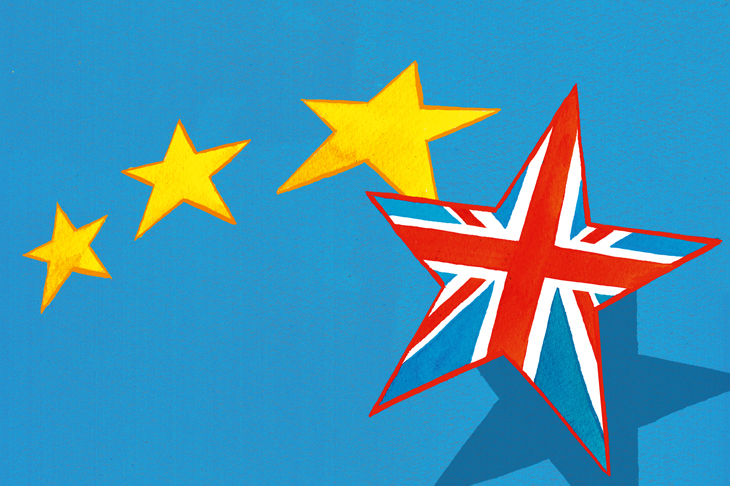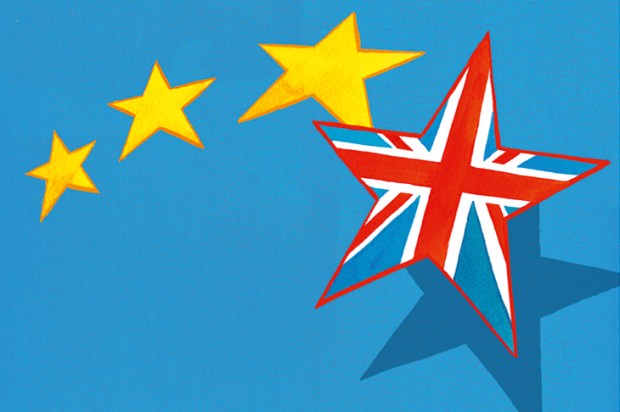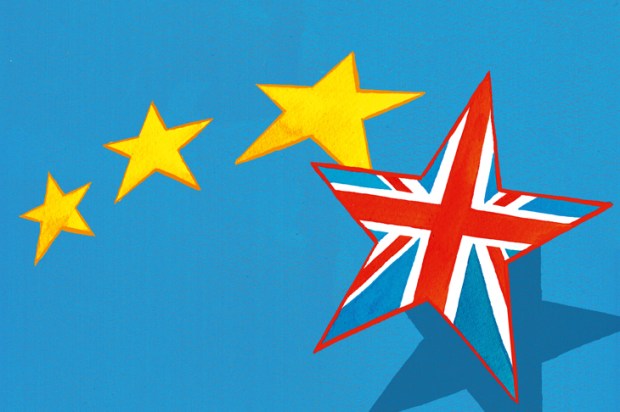On 29 March 2019 the Queen should have a state dinner and invite the European Union’s 27 heads of state and its five presidents. The evening’s purpose would be to toast the new alliance between the United Kingdom and the EU: one based on free trade, security cooperation and shared democratic values.
This celebration of the new alliance will be especially welcome after two years of negotiations which are bound to be fraught and, at times, ugly. The complexity and the sums of money involved pretty much guarantee this. There is, though, a particular onus on Britain to keep things civil. We have chosen to end this failed relationship, so we should brave the insults and not feel the need to respond to every Juncker jibe. Boris Johnson, the Foreign Secretary, puts it this way: he says that Britain is moving from inside the cathedral of the EU to become a ‘flying buttress’ supporting it. When he first made the point, in Bratislava, it was mistranslated to the French delegation as flying bucket’ — causing much confusion.
James Forsyth, Fraser Nelson and Hugo Dixon discuss the possibility of a ‘velvet divorce’:
So, this will be Mrs May’s mission: to make clear that, to her, the Article 50 talks are as much about starting a new relationship as ending an old one. After all, as Fredrik Erixon explains, both Britain and the EU will benefit from one an-other’s success. The EU is Britain’s largest export market and the EU exports more goods to Britain than to any country outside the EU.
Distressed Remain voters should console themselves with the fact that, whichever way you look at it, the old relationship never really worked. In 1973 we joined a club that was explicitly committed to ‘ever-closer union’. We knew this mission was incompatible with our understanding of parliamentary sovereignty, but we signed up anyway because the country had lost an empire and not yet found a role. We spent the next 40-odd years grousing about it, constantly surprised that the EU was doing what it was set up to do.
This is why, for all the talk of a country split down the middle, Britain will not be divided for generations over Brexit. It’s a rare Remainer who wants to be part of a European state, and this is what the eurozone will have to become if it is to succeed in the long run.
Once Britain has gone to the trouble of extricating itself from the EU web, there will, of course, be a political space for a party (perhaps the Lib Dems) that wants to take us back in. But this will not be a prospectus for government; it will be a minority concern, commanding the support not of 48 per cent of voters but of 18 per cent or so at best.
How will we stay in Europe when we’re out of the UK? Mrs May will have to show she means what she says about a ‘new, deep and special partnership’. She must indicate that the United Kingdom is determined to play its part in addressing the continent’s challenges — and overcompensate where necessary. She should, for instance, commit this country to helping deal with the migration crisis in the Mediterranean, which will continue for decades, in both humanitarian and security terms. She must take every opportunity to show that Britain will be a good European. After all, European values are quite separate from the EU.
Donald Trump’s ambivalent attitude to Nato means Britain is more important to Europe’s security than it has been in 60 years. Michael Fallon, the Defence Secretary, has been making much of Britain’s commitment to deter Russian aggression in recent deployments to the Baltics. But the increased importance of Britain to Europe’s security should lead to a big rise in UK defence spending. A public commitment to that would remind EU negotiators not only of Britain’s commitment to the continent’s defence, but also of the importance of a prosperous UK to the security architecture of Europe.
There is a monumental public diplomacy job to be done to persuade the remaining 27 EU member states that Brexit is not a wholesale rejection of continental cooperation. One idea would be a new scholarship scheme designed to ensure that hundreds of the EU’s brightest young people are brought to study at UK universities every year, to show we’re not pulling up the drawbridge.
Brexit’s global image hasn’t been helped by Nigel Farage’s determination to make himself the face of it. But the government has also not helped itself. Its initial approach to EU nationals living here was too calculating. The decision to include international students in the migration target is a policy that Downing Street still defends robustly, but many cabinet ministers admit to disliking. It seems to suggest that Britain is closing in on itself and now wants to keep away foreigners.
It is here that Mrs May’s uncompromising attitude helps those who, unfairly, seek to cast her as a Little Englander. Surely that one in ten countries are led by someone who has been educated in Britain is an asset? For the Prime Minister to have gone to India in November without a more positive message on immigration was a missed opportunity. Senior government figures admit that her failure on this point led to a sense there that Britain is no longer a welcoming place for their best and brightest.
May must show that Britain wants to remain open to the world. She should emphasise this country’s belief in free trade, perhaps offer to negotiate free-trade agreements with all countries eligible for development aid.
Over the next two years, it will be tempting to concentrate on the drama of the negotiations. No doubt the talks will be declared dead several times before agreement is eventually agreed. Business will also be particularly vocal about what might be changing, because UK membership of the single market is the status quo.
But let’s not forget all the while that Britain will enjoy huge opportunities once free from EU oversight. Brussels responds slowly to change, and struggles with the most innovative areas of the economy. It responds in an overly fearful and reactive way to technological advances. The judgements of the European Court of Justice are also unpredictable; and the Charter of Fundamental Rights is exacerbating this problem. There is, for instance, no certainty about the decisions it will come to on issues such as genetic medicine. Once outside the EU, Britain can become the best place in the world for medical research such as gene editing, the development of driverless cars and tech start-ups in general.
This is not a zero-sum game: the EU does not need to fail for Brexit to succeed and it would be as well for hardened Brexiteers to remember this. As one senior figure involved in the preparations for the negotiations points out, a Marine Le Pen victory in France would make a free-trade deal impossible and guarantee that tariffs are slapped on all sales to the EU. Why? Because a Le Pen presidency would paralyse the EU: there would be no one to negotiate with. Indeed, if the EU economy is growing, then it will be that much easier to make Brexit a success.
From outside the EU, this country can avoid getting dragged into the coming intra-EU fights over ever-closer union. If Britain was staying in, we would have to decide whether to back those eurozone countries who want integration, or to support eastern European states such as Poland and Hungary who are deeply worried about it, fearing that this will make them second-class citizens within the union.
Leaving the EU is no guarantee of success for Britain: it is merely the removal of a constraint. We will have the freedom to make more policy choices in pursuit of greater prosperity. But the first of these choices should be an open and generous-minded approach to the EU — even if Brussels is not in the mood for being open and generous to us.
After four decades of moaning, Britain will soon be ready to be a good European — a point that Theresa May is willing to make. All she has to do now is persuade Europe that she means it.
Got something to add? Join the discussion and comment below.
Get 10 issues for just $10
Subscribe to The Spectator Australia today for the next 10 magazine issues, plus full online access, for just $10.















Comments
Don't miss out
Join the conversation with other Spectator Australia readers. Subscribe to leave a comment.
SUBSCRIBEAlready a subscriber? Log in